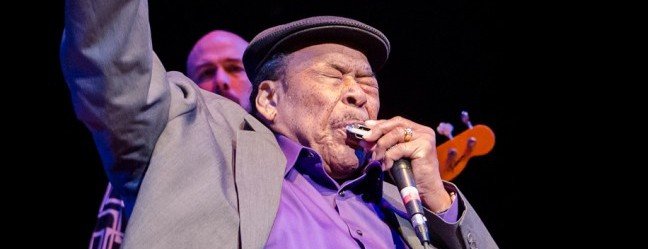This is the latest installment of our weekly series, The Language of the Blues, in which author/rocker Debra Devi explores the meaning of a word or phrase found in the blues.
Grab a signed copy of Devi’s award-winning book The Language of the Blues: From Alcorub to ZuZu (Foreword by Dr. John) at Bluescentric.com. Also available on Amazon Kindle. “One of the wittiest, bawdiest, most fascinating dictionaries ever.” (Reuters)

Harp is blues slang for a harmonica, which is also called a comb. Down South a harmonica is sometimes called a mouth harp or a French harp. Glenn Weiser, author of the fascinating book Blues and Rock Harmonica, told me this is because in the late 1800s, the Carl Essbach company marketed a couple of harmonicas (model numbers 22 and 44) with the name “French Harp” on the covers. The French Harp harmonicas happened to be especially popular in the South during the early part of the 20th century, coinciding with the emergence of the blues.
According to Weiser, the forerunner of the modern harmonica, the accordion, and the concertina is a free-reed instrument invented by Chinese Emperor Nyn-Kwya in 3000 B.C. Called the sheng, it was brought to Europe in the early 1800s.
Free-reed instruments use a reed framed in a chamber. The reed freely vibrates when air passes over it. These vibrations cause the characteristic warbly sound of the harmonica and the accordion. The sheng is the oldest known free-reed instrument. With fixed-reed instruments, in contrast, such as the clarinet, the saxophone, the Indian shanai and the Chinese sona, the air passing over the reed vibrates in sympathy with the reed, producing a clearer tone, less distorted tone.
African American musicians explored the limitations of the harmonica and played with the way that its notes could be lowered in pitch or “bent” by changing the pressure exerted on the reeds. W.C. Handy recalled hearing train imitations played on the harmonica by blues musicians as early as the 1870s. As Weiser notes in Blues and Rock Harmonica, “The ‘blue’ notes of the African vocal scale and the moans and cries of the field holler had been successfully reproduced on a new instrument.”
Pick up a copy of Language of the Blues
Some Blues Harp Classics:
“Juke” – Little Walter
“The Creeper” – James Cotton
“Christo Redemptor” – Charlie Musselwhite
“Bye Bye Birdie” – Sonny Boy Williamson II
Video:
Sonny Boy Williamson – Harmonic Solo
James Cotton – “The Creeper – Live”


